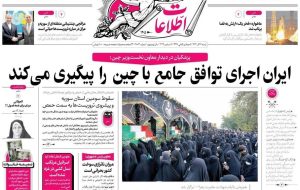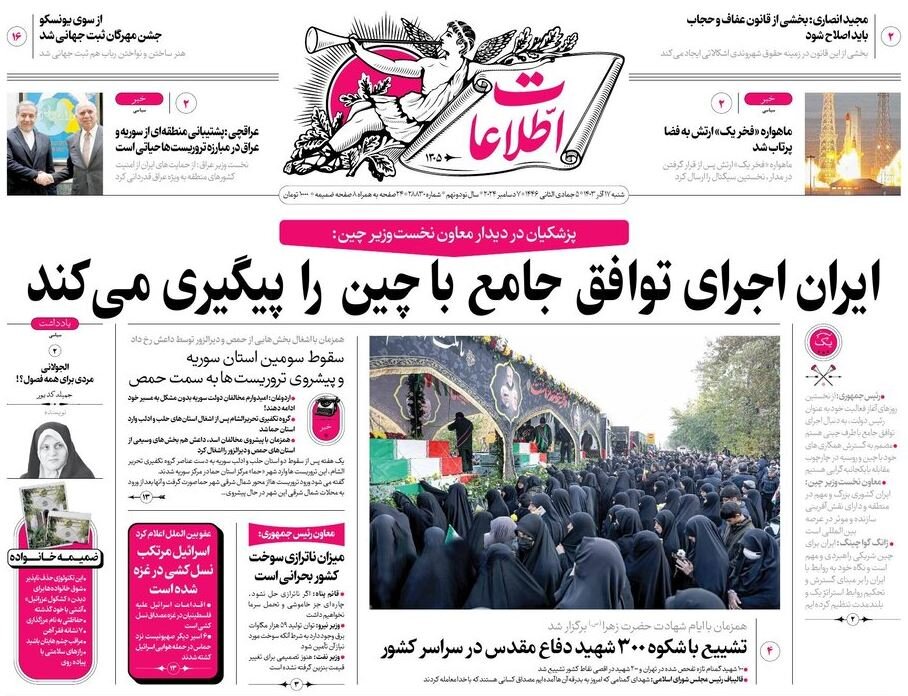The impact of America’s “peace through strength” strategy on Iran
TEHRAN – In a note, Ettelaat addressed Trump’s strategy in foreign policy and wrote: Donald Trump seems to adopt the strategy of “peace through strength” in foreign policy. This strategy, which was somehow implemented in his first administration, is rooted in conservative and traditional principles of American foreign policy. This policy has had great impacts


TEHRAN – In a note, Ettelaat addressed Trump’s strategy in foreign policy and wrote: Donald Trump seems to adopt the strategy of “peace through strength” in foreign policy.
This strategy, which was somehow implemented in his first administration, is rooted in conservative and traditional principles of American foreign policy. This policy has had great impacts on the countries that America considers its enemies. For example, Trump’s withdrawal from the JCPOA and the imposition of crippling economic sanctions on Iran led to a great inflation rate, increase in military pressure in the Persian Gulf, and cyberattacks. In effect, they affected the expansion of Iran’s regional influence. In line with the “America First” policy, Trump has repeatedly withdrawn from international agreements (such as the JCPOA and the Paris climate agreement). Strengthening regional strategic alliances was another goal of this policy in the Trump administration that was mostly highlighted in the Abraham agreements between Israel and the Arab countries.
Hamshahri: The West’s endless claims against Iran
In a commentary, Hamshahri addressed the claims of the U.S. National Intelligence Agency about Iran’s nuclear, missile, and drone capabilities. It said: The U.S. has claimed that Tehran is not currently preparing to build a nuclear weapon, but is carrying out activities that will put it in a better position to produce an atomic weapon. Although Iranian authorities have emphasized that the production and use of nuclear weapons has no place in Iran’s defense program and the nature of Iran’s nuclear program is purely peaceful, the claim of military goals in Iran’s nuclear program is repeated by the United States and its partners and allies. The West has accused Iran of sending missiles and drones to Russia for use in the Ukraine war. However, unlike the obvious military intervention of the West in the Ukraine war which is sending weapons to the (eastern European) country, Iran does not support any of the warring parties and declared its readiness to mediate to reach a political solution to the conflict.
Siasat-e-Rooz: Deathtrap for terrorists in Syria
In an analysis, Siasat-e-Rooz dealt with the terrorist attacks of the Hayat Tahrir al-Sharm (HTS) takfiris in Syria. It wrote: If the takfiris win in Syria, the consequences of such an event will affect countries such as Iran, Iraq, Lebanon, Yemen, etc. It is impossible to believe that the government and army of Syria, Iran’s forces stationed in Syria, and the Russian army were not aware of the movements of Takfiri terrorists stationed in Syria, who are receiving special support from Israel, America, and other countries. To counter such movements, the best policy is to pretend to be unaware so that they are caught in a trap and then the forces of the Syrian, Russian, and Iranian armies. Terrorists enjoy wide support and their media have resorted to psychological operations to present themselves as the victors of the battlefield, but the victors of this battlefield cannot be Takfiri terrorists and the countries and regimes that support them. Syria will survive. Terrorists will not be allowed to occupy, destroy, and divide this country.
Iran: The possibility of changing the equations
Foreign Minister Seyyed Abbas Araghchi started a new round of urgent consultations in Baghdad to extinguish the fire of conflict in Syria. The foreign minister’s statements regarding the developments in Syria should be interpreted as a strategy to defend the country’s national security against the militants. In the inflammatory atmosphere in Syria, Araghchi’s intensive consultations during his trip to Damascus, Ankara, and Baghdad (and Doha on Saturday), along with the telephone conversations of the Iranian president with his Syrian and Russian counterparts in this regard, have shown how serious Tehran’s decision to support the Damascus government is. Given its military capabilities Moscow, has put military countermeasures against these attacks on the agenda. At the same time, it has welcomed diplomatic moves to settle the conflict. The current supporters of terrorists, such as Turkey, may not have counted on the role that Iran and Russia can play on the battlefield against armed opponents; a decision that can upset the current equations and undermine the dreams of the aspiring architects of the Syrian battle.
